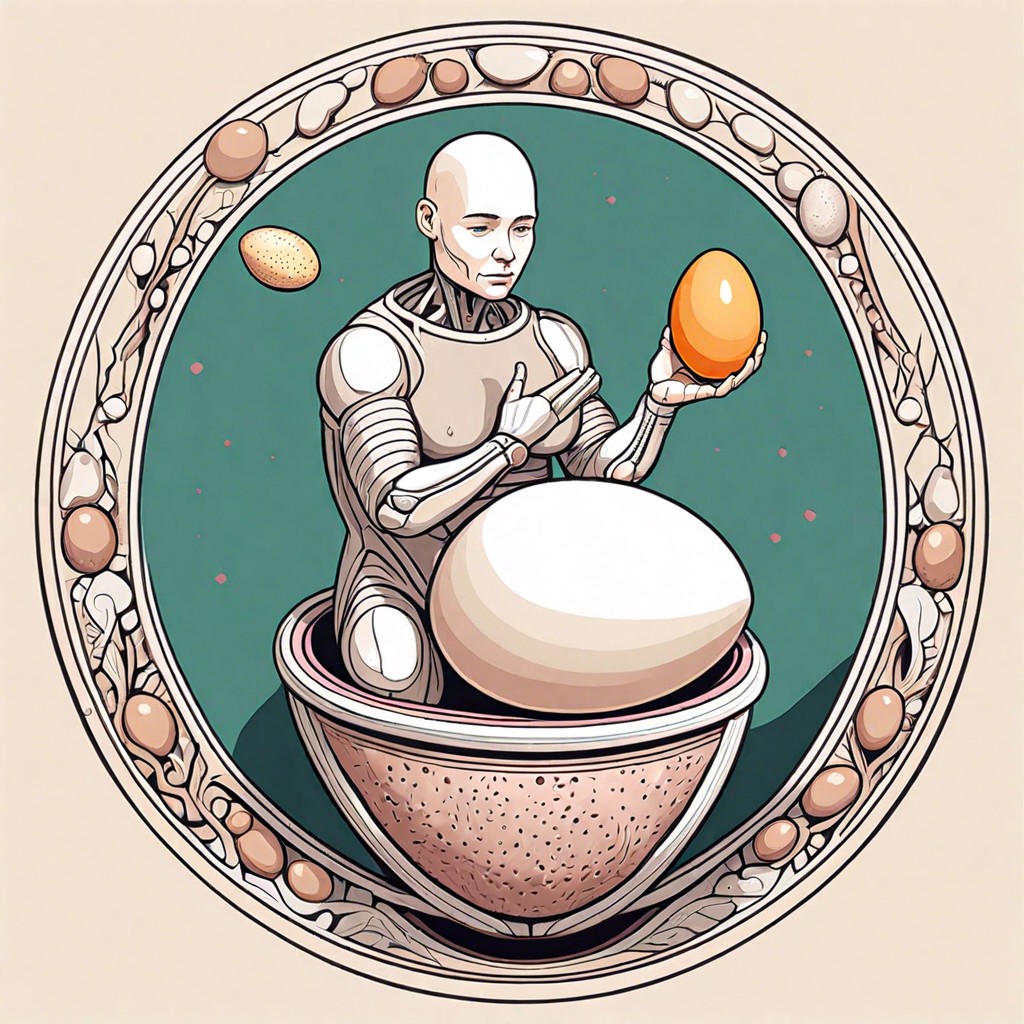Discover how human life would be different if we laid eggs, from parenting roles to societal changes.
Imagine a world where humans laid eggs. Wild, right? Forget about gender reveal parties; we’d have egg reveal parties! This article will scramble your understanding of biology, social roles, housing, evolution, and healthcare. Keep reading to break the shell on all these egg-citing possibilities!
Key takeaways:
- Humans would shift to laying eggs instead of giving birth.
- Parental roles would evolve, with both parents sharing egg care.
- Housing would require high-tech hatcheries for egg incubation.
- Evolution could lead to energy efficiency but also increased vulnerability.
- Healthcare would adapt to cater to egg-centric reproductive methods.
Reproductive Changes and Biological Impact

Imagine a world where our reproductive system borrows a page from the avian playbook. First off, forget about regular pregnancies. Potential parents would shift from baby bumps to egg bumps. That means growing a hard-shelled vessel within which the baby would develop.
Humans would carry these eggs for a while, but instead of birth, there would come a day when they lay the egg. Seats on public transport? Designed for the egg-desperate rush hour. No more awkward commutes.
Hormones could get less extreme since the egg would provide an external environment for development. Less drama, but maybe a little bit of pecking order.
Men might get envious. Or not. After all, playing catch with an egg is safer than with a newborn.
Also, imagine the biological implications. Fitness regimes would shift to cater for optimal egg-laying conditions. Crunches galore. And calcium supplements? Forget the occasional tablet; they’d be a new food group.
Implications for Parental Roles and Social Structure
Imagine Dad taking on a new role: egg-sitting! With humans laying eggs, both parents could share the responsibility of keeping these precious cargoes warm and safe. Parental leave might become “egg leave,” and companies might install cozy egg incubators in the office. Dinner table debates could revolve around optimal egg-turning schedules.
Societal norms could shift dramatically. Single parenting might gain a whole new level of ingenuity with custom-built egg cradles. Parental leave wouldn’t just be for moms anymore; dads could get equal time off for egg-tending duties. The classic lullaby ritual could switch to egg-rocking playlists.
Schools might offer “Egg 101” courses to educate future parents on the best practices in egg care. Babysitting might involve learning to incubate eggs safely, replacing diaper-changing tutorials. Egg technology would become a booming field, bringing together engineers and biologists to design the perfect incubator.
In essence, day-to-day family life would gain a new dimension, where nurturing takes on an entirely unique form. Consider the social gatherings featuring proud parents showing off their beautifully decorated eggs—baby showers would never be the same.
Housing and Incubation Requirements
Forget getting cozy in maternity wards; we’d need to upgrade to high-tech hatcheries! Picture a hybrid between a nursery and a chicken coop, but with central heating and Wi-Fi. To ensure proper incubation, temperature control would be crucial. We’re talking state-of-the-art climate systems to maintain that sweet spot around 99 degrees Fahrenheit.
Urban planning would take a creative turn. Apartments with built-in incubators? Sure, why not! Community incubation centers could become a thing, similar to current daycare facilities.
Safety and security for these eggy bundles of joy would require new regulations. Baby monitors? Make way for egg scanners.
Parents might even take turns incubating in a shared, cozy nest. Talk about bonding time! Incubation pods at work? The new must-have office perk.
In essence, creating the ideal environment for egg incubation would be a mix of tech innovation and parental involvement, making the journey to hatching an egg-sperience to remember.
Evolutionary Benefits and Drawbacks
Imagine the human species evolving to lay eggs – talk about a game-changer! First up, let’s consider the energy efficiency. Eggs can be developed externally, allowing mothers to carry on with daily activities without lugging around a growing baby bump. No more waddling around like a penguin during the last trimester!
On the flip side, evolution might not be all sunny-side up. Vulnerability increases; eggs are exposed to predators or environmental hazards. Can you imagine needing an egg-sitter while you go grocery shopping?
Then there’s genetic diversity. More exposed to environmental factors, eggs might adapt quicker to change, possibly boosting our survival rate in changing climates. It’s evolution’s fast pass.
But watch out for the biggest hitch – social dynamics. Who safeguards the egg? Evolution might push for community caregiving, but will everyone play fair? Suddenly, the evolutionary pressure cooker is on in ways it has never been before.
Impact On Healthcare and Maternity Services
Imagine the maternity ward suddenly looking like a cross between a nursery and a high-tech hatchery. Instead of delivery rooms, we’d have incubation chambers, buzzing with warmth and humidity controls. Nurses would need a whole new set of skills to handle these egg-centric arrivals. Goodbye Lamaze classes, hello egg-spinning techniques.
Forget about traditional birth control. With eggs, fertility treatments might become as simple as a visit to the local incubator center. Fertility rates would be more predictable and manageable. Think of it as planning a vacation, but for babies.
Health checks and prenatal care would involve regular egg scans, and fewer worries about morning sickness. Doctors would examine shell thickness and embryo development, probably resembling a scene from a Jurassic Park lab, minus the raptors.
Public health campaigns might shift from prenatal vitamin ads to “Keep Your Egg Safe” posters. Maternity leave? More like egg-sitting leave, as parents take turns rotating the egg to mimic natural hatching processes.
In short, transforming an ER into an “Egg ER” would mean dramatic shifts in how we approach childbirth, meld science fiction with reality, and keep it all cracking along smoothly.




